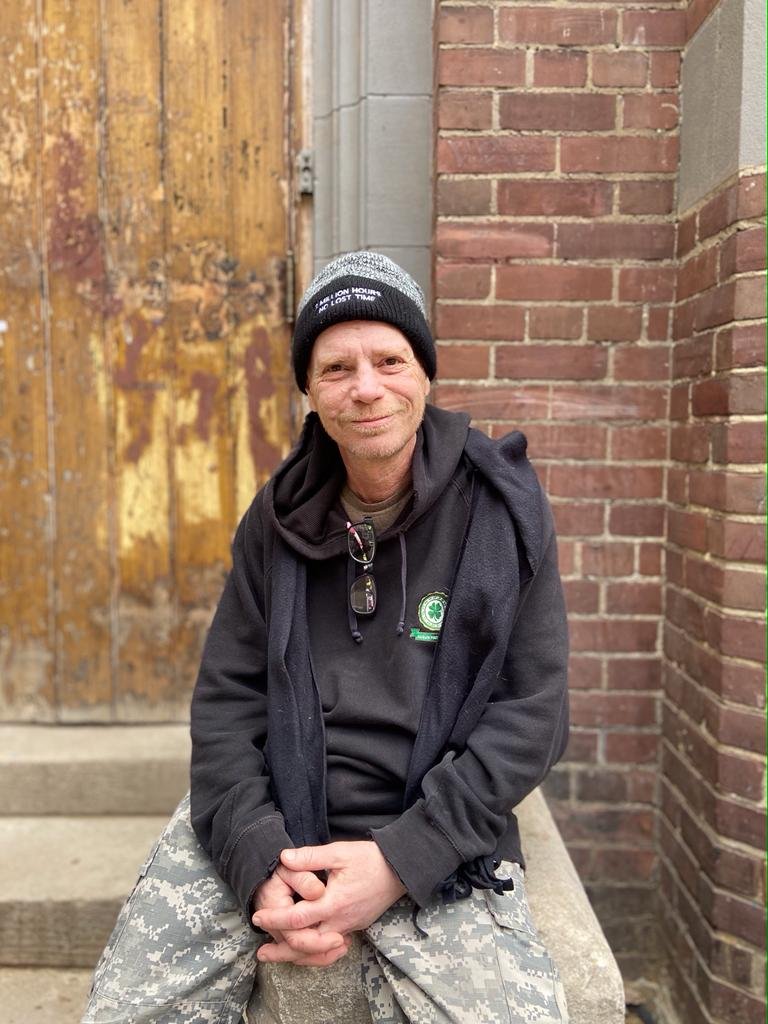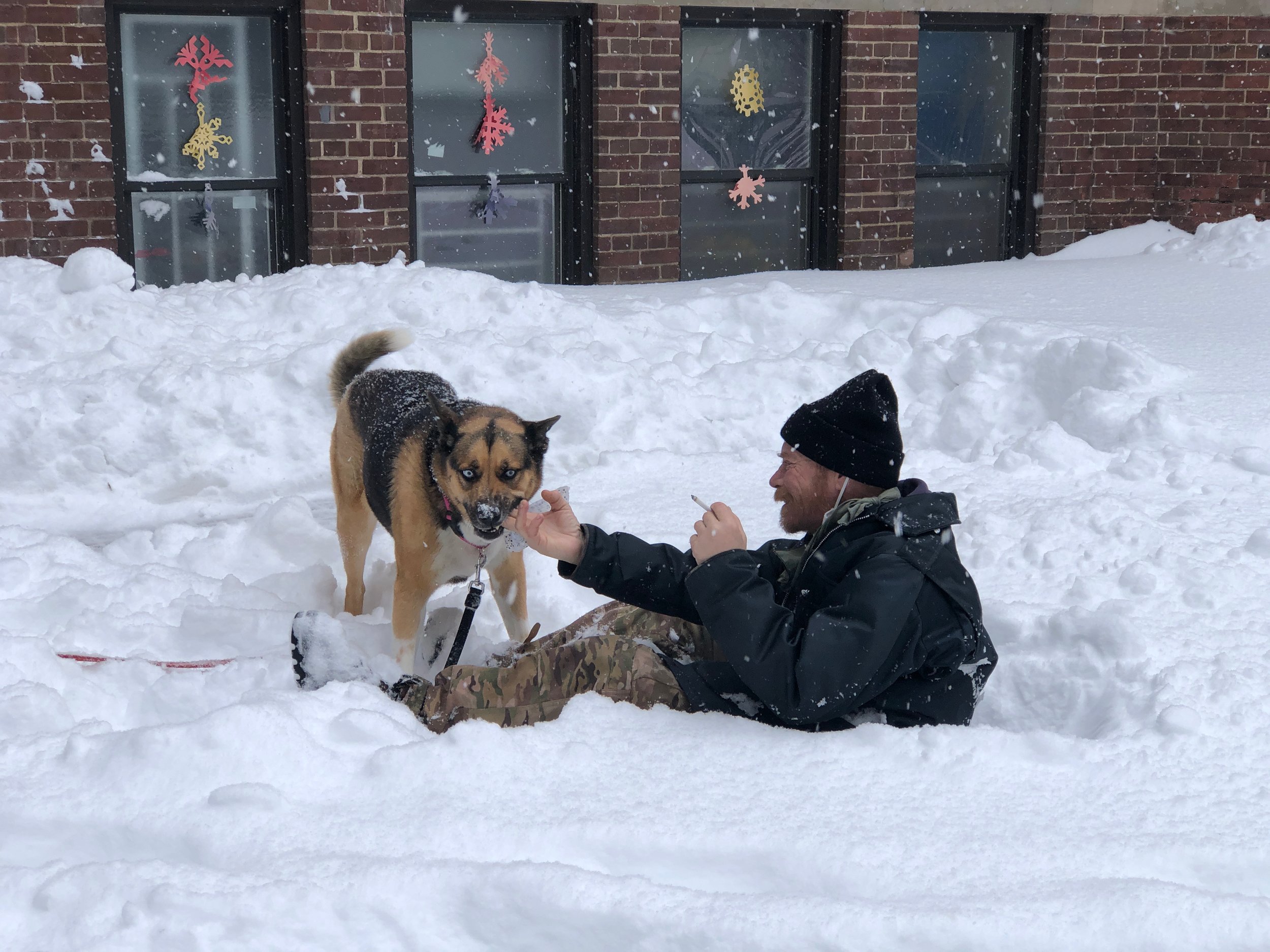“If You’re Feeling Lost, You Can’t Heal”
By Alejandra Adarve
Rob is smart, kind, and soft-spoken. He has a great sense of humor and one of his best friends is a German Shepherd named Mary Jane. We've been working together for the past three years, but I didn't know Rob's story. He spoke with me during Art drop-in and shared some wise thoughts on mental health, life on the streets, and the value of friendship in the healing journey.
Rob, how did you become a part of Sanctuary?
It's kind of funny. I was introduced to Sanctuary because I used to work in this neighbourhood for a long time. I used to work at Kitty Corner, right at Yonge and Isabella, for about 12 years. I was the restaurant manager, but I was never aware of this place even though I knew the neighbourhood. I used to be on the streets when I was 16 and this was my sort of neighbourhood too. Then I got back on the streets and a gentleman I met up at one of the shelters I was staying at not far from here, Al Key—unfortunately he’s passed away—he introduced me to here and I found it very accommodating, even at first when I didn’t know a lot of people. I didn't know any of the staff, I didn’t know anybody, but they made me feel welcomed and I ended up sleeping beside here for a while. I didn't want to be homeless, but that's the way it was, unfortunately. I had been doing very well for quite a few years, doing renovations and construction. I was very successful, but things went downhill pretty quick, pretty quick. It happens. It’s not an excuse. That’s just the way it is. So I lost my mojo, but coming here—and not just when it was open—but hanging out with somebody kicking around I just got to know people and know the atmosphere of Sanctuary: the caring, the non judgemental. I saw really good things happen to people through Sanctuary and the help, the love and support that people give. Even simple things, like going to my Doctor for the first time in two years. I was embarrassed because everything she would try to do for me I screwed up and I didn’t want to waste her time, but one of the nurses took me to the Doctor after I got a hold of her and my Doctor was very happy that I came back. But you know, to have that support, because I wouldn’t have done it otherwise.
How are you doing these days?
I’m doing better. I have my own place. I also feel like I’m in a better mental situation. I’m much better with my substance abuse that I have been over years and it has a big part to do with the people here, not the programs. I don’t go to AA, I don't go to anything like that, but it's the support, knowing that people believe in me and I can do things. To me that's very important. I’m trying to learn that and pass it on to people.
Maybe being loved is a big part of healing?
Yes! If you’re feeling lost, you can’t heal. If you don’t have any family, if you’re feeling lost and lonely it is really hard to get your shit together. It’s really hard to motivate yourself. I didn’t know what to do or where to go. I was living in a tent with my friends.
And that was not the first time?
That was not my first time being homeless. I was kicked out on my 16th birthday. $50 in my pocket. Shall we say, I had an emotionally disturbed adolescence—back then that's what they called it. So I’ve been homeless before. I was a crack addict after I had a really good job at the Keg. I was Kitchen Manager when I was 26 at Keg Mansion down at Jarvis and Wellesley. I felt really good. Unfortunately, I got into crack and within four months everything was gone: my house, my wife, everything. I struggled back from that and things got better, but again, something. I always taught myself, and I still believe this, without your downs in life, you really don’t feel your ups—If you don't know how hard it can be, you may not understand you need to be generous when you are up there. And I’m not talking about money. I’m talking about support, being there for people, and passing off when you’re feeling good. Just that vibe of feeling good. You don't have to talk, just be there.
You are now a contract worker at Sanctuary. How do you support the community?
I started doing a little bit more. I’ve been helping out, working a little bit. But I also do a lot of walking because I have a dog—Mary Jane. So I walk with MJ and I load up my nap-sack a few times with hand warmers, a few pairs of socks (I have so many socks at home!) and a couple of smokes. I really enjoy going out to Dundas West or High Park, even going to the trails in the bush, and say “Hey guys, I got some hand warmers.” I slept in High Park when I was homeless this time—this time, that sounds funny—and the time before. I slept in High Park quite a bit. I know the area very well.
How did you meet Mary Jane?
That was when I was staying at a respite center called Margaret’s, which is just north to Sanctuary by Church Street. Across the street there is a Toronto Community Housing place and, through friends, I met this lady and she had this really cool dog named Mary Jane—you all know why—and we just developed a relationship with that lady, but also with the dog. The lady is a little bit older, and she doesn't mind letting me have Mary Jane for a week. I think, sometimes, she enjoys the break. It's like giving your kids to the grandparents for Christmas holidays!
So, Mary Jane and you are just friends!
Yes. She's not mine, but I still have her for six or seven days straight, and I enjoy it. She is a wonderful dog, she is so smart, as anybody here can attest. She just loves people, little kids, and kittens. She makes friends with everybody, but she knows sketchy people—she knows when people are not in the right state of mind. She’s awesome. I really enjoy having her over.
Tell me about some of your memories at Sanctuary.
There’s too many sad memories, unfortunately. Especially during Covid. I was still in a tent and a lot of people were not taking care of their health and mental issues. So there was a lot of tragedy, to say the least. Everything from pulling my friend—the gentleman who introduced me here—I pulled him out of a tent because he wasn't responding. He wasn’t doing good. Actually, an hour before he passed, he asked me for a drink and I said “No, unless you get out of your tent.” He had not gotten out of his tent because he was too sick. Alcohol poisoning. Our friends were taking care of him, washing him, bathing him. I left and ended up coming back and I said "Hey Al, how are you doing?” No response. No pulse. I pulled him out of the tent with Mark. They brought him back, but unfortunately he was brain dead. There were a lot of tragedies like that. It was a pretty sad time. You didn’t know who was going to be next—and it is still going on. I don't use opioids myself. I have, but they’re prescribed and I never got addicted. Thank goodness. I’ve been addicted to enough. One thing that gets me is how in the mainstream media they go “Oh, they got 68 shootings in Toronto.” Well, in fact, there were 3,200 deaths last year because of the opioid crisis. 3,200 across Canada—not even close to the amount of shootings. Nobody cares about that. That just really annoys me. “We gotta do this, we gotta do that.” People try, but it’s more the grassroots community that really tries to get anything done. Because it’s not just drugs—it’s homelessness, it’s lack of housing, it’s lack of resources. If you are on ODSP they make it really difficult for you to actually try to carry a job, on top of being on ODSP. Back in 2020 you were not allowed to work up to $200 a month, and that’s nothing! What's the point of trying to work? There was no incentive.
The system makes things harder for those who are already having a hard time…
Yeah. There is no incentive to get people back into work. I’m very fortunate because through here (Sanctuary) and also Toronto Community Housing workers, I was lucky enough to get a place a couple of years ago. I’m really happy with it, but there's still many people that I know are at the hotels. I stayed in a hotel for a summer—one of the city-run ones—and I can’t understand why they’re putting a whole bunch of people there, that are already homeless, that have issues of whatever nature, together at the same time. There is going to be problems! And then, they’re sticking them in a rich neighbourhood. All of a sudden, you shove 200 homeless people at Yonge and “Eligible” where all the bathrooms are close, anywhere during Covid. I used to break into construction potties. I’d carry lock cutters. In the tent, my friend Nikki needed to use the washroom at 4:00 in the morning. We’re not making a mess, we’re not doing anything silly, but we gotta take care of ourselves. Especially during that time. You couldn’t go to the malls, you couldn’t go to the library. You’re homeless. What the heck are you going to do?
I am sorry my question reminded you of sad memories.
But I do have good ones—back to Al Key. He was the one who introduced me, and the first time I came here for dinner, it was awesome! They had roast beef, potatoes and stuff, and on every table, there were two jugs of mushroom gravy, and I just made a big huge stew! I said “I don’t want a plate, I want a bowl!” I just made this huge stew. That was wonderful. I’ve enjoyed doing some fundraising things, meeting some corporate people, but also meeting the community that is supporting Sanctuary. It’s not just “here are some sock donations,” but there are some serious people behind what Sanctuary does that believe in it.
You are one of those serious people!
I’m one of them, but I also like to show them that we appreciate it and do what I can. Sometimes I get really frustrated here—stuff happens. But in general, it’s very calm. People have issues, but we all have issues.
Like in any good family?
Yeah, exactly. We’re like a family.


